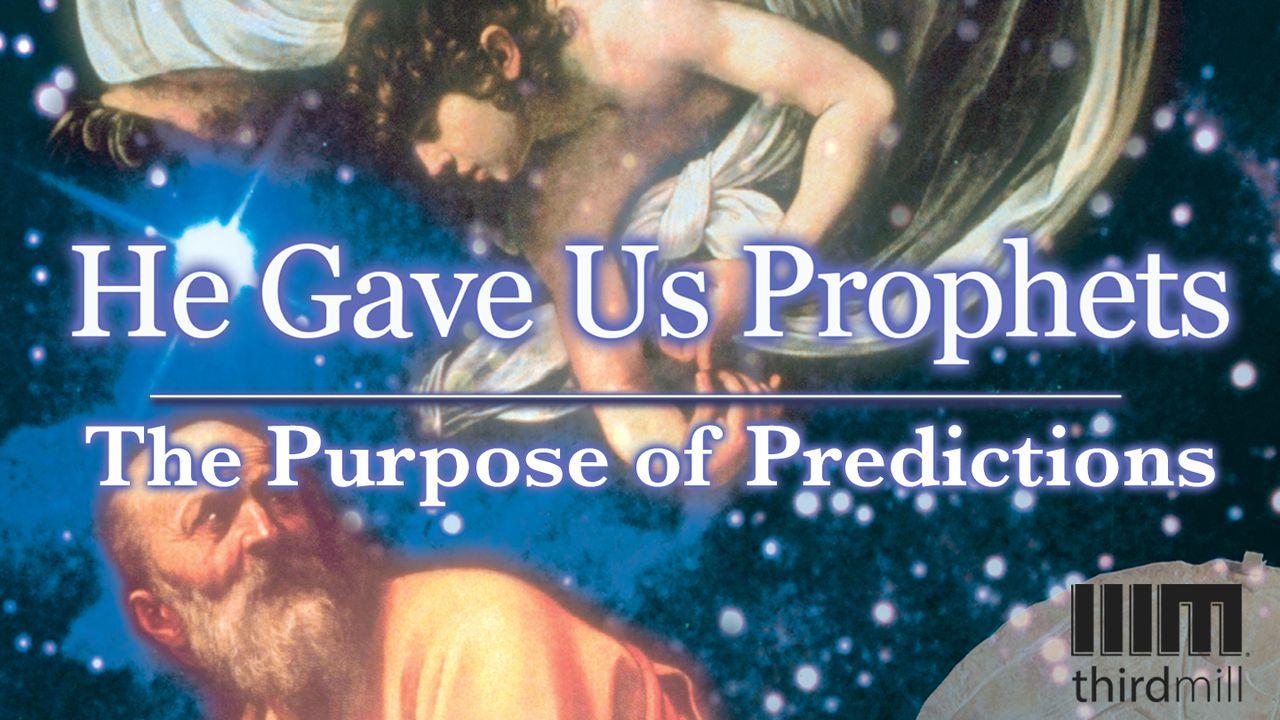He Gave Us Prophets: The Purpose of PredictionsMuestra

God’s Providence: Jeremiah 18
So far, we’ve seen that sometimes God works out His eternal plan through the contingencies of human choice. At this point, what we’re going to see is that these kinds of human contingencies had a significant effect on the predictions of Old Testament prophecy. Sometimes human choice intervening between the prophetic prediction and the fulfillment of that prophecy could have a significant influence on the outcome of history.
Let’s look at the basic or general pattern involving predictions and historical contingencies. Perhaps the best passage in the prophets for helping us see this general pattern is Jeremiah 18:1-10. This passage is so important that we should look at it carefully. We’ll touch on three aspects of this passage: first, Jeremiah’s observation in 18:1-4; second, the Lord’s explanation in verses 5 and 6; and third, the Lord’s elaboration in verses 7 through 10.
First we have Jeremiah’s observation in verses 1 through 4:
This is the word that came to Jeremiah from the Lord: “Go down to the potter’s house, and there I will give you my message.” So I went down to the potter’s house, and I saw him working at the wheel. But the pot he was shaping from the clay was marred in his hands; so the potter formed it into another pot, shaping it as seemed best to him.
God tells Jeremiah to go to a potter’s house. Jeremiah entered the potter’s house where he saw the potter working in one way with the clay and then changing his design when he saw the clay become marred. The potter worked with the lump of clay, shaping it as seemed best to him. Jeremiah’s observation at the potter’s house had an important symbolic value that God wanted Jeremiah to see. So, in verses 5 and 6 the Lord told Jeremiah the significance of this experience:
Then the word of the Lord came to me: “O house of Israel, can I not do with you as this potter does?” declares the Lord. “Like clay in the hand of the potter, so are you in my hand, O house of Israel.”
This passage reads as many do in the Bible; the potter represented the Lord and the clay represented Israel. As this passage makes clear, God reserved the right to do with His people as seemed best to Him, just like a potter would with his clay. Of course, as we have seen, God would never violate His immutable character, nor His covenants, nor His eternal plan. Yet, within these parameters, God is free to vary the ways He handles His people.
With the potter’s observation and then God's explanation in mind, we're in a position the see how God elaborated on this event. In a word, God applied this analogy of the potter and the clay to prophetic predictions. In the first place, God mentioned predictions of judgment in verses 7 and 8:
If at any time I announce that a nation or kingdom is to be uprooted, torn down and destroyed, and if that nation I warned repents of its evil, then I will relent and not inflict on it the disaster I had planned.
Notice the way God described the situation. He says that at any time, with respect to any nation, He may announce judgment to come. Yet, if there is an intervening historical contingency of repentance, then God may relent. The fulfillment may not take place as predicted. In a word, the historical contingency of human choice could make a big difference in the way God fulfilled a prophecy of judgment.
Now to show that this principle applied also to other kinds of predictions, God spoke of predictions of blessing in verses 9 and 10:
And if at another time I announce that a nation or kingdom is to be built up and planted, and if it does evil in my sight and does not obey me, then I will reconsider the good I had intended to do for it.
Notice the parallel situation. God said that at any time, and with respect to any nation, He may announce the blessing of security and prosperity; yet, if there is an intervening historical contingency of rebellion and disobedience, then the result may be that God may relent from doing the good He had intended.
Jeremiah 18 teaches us a principle that we must be ready to apply to every biblical prophecy. God told Jeremiah that He was free to react to the way human beings responded to threats of judgment and offers of blessing. As we take a look at biblical prophecy, we’ll discover that God often watched to see how people would react to the prophetic word and then determined what to do in their future.
Escritura
Acerca de este Plan

This reading plan explores four topics related to prophetic words about the future: God's sovereignty, human contingencies, degrees of certainty, and desired outcomes.
More





